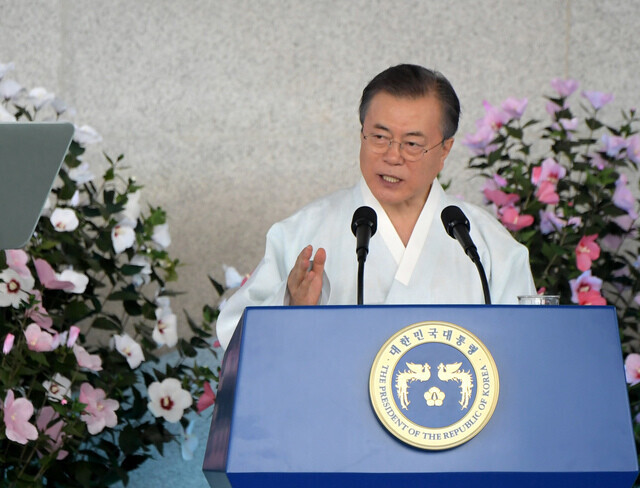hankyoreh
Links to other country sites 다른 나라 사이트 링크
[News analysis] Can S. Korea-Japan relations be repaired?

Will South Korea and Japan have the wisdom to try to mend diplomatic relations? Or will they cynically wait for their crumbling relationship to fall to pieces?
On the eve of the 75th anniversary of Korea’s liberation from Japan’s colonial occupation, differing opinions are being expressed in the two countries about how to repair their bilateral relations and overcome an intense quarrel that has lasted for more than a year.
Some people think that the huge gap in the two countries’ positions about the South Korean Supreme Court’s ruling in October 2018 that ordered compensation for forced labor victims makes a solution nearly impossible. But as time goes by, more people are subscribing to the view that diplomats from the two countries should stick with the negotiations until they can reach a compromise.
In July 2019, Japan tightened regulations governing the exports of hydrogen fluoride and two other materials needed by South Korean semiconductor manufacturers. Following that retaliatory act, support for abandoning Japan’s ties with South Korea or allowing a partial rupture gained currency in the Japanese mainstream.
A leading advocate of this view is Yuichi Hosoya, a professor at Keio University who has a considerable influence on Prime Minister Shinzo Abe’s foreign policy. “What is important for Japan on a geopolitical level is the actions of the US, its ally, and of China, which is becoming a regional hegemon. It would not be wise to let ourselves be drawn into investing major diplomatic resources into our relations with South Korea,” Yosoya wrote in a column for the Yomiuri Shimbun, a Japanese newspaper, in August 2019.
That mindset is widely shared by mainstream figures in Japan such as former Defense Minister Itsunori Onodera, who thinks that Japan should “politely ignore South Korea,” and Defense Minister Taro Kono, who argues that South Korea doesn’t deserve an explanation of why Japan is seeking the ability to strike enemy bases.
But during the intervening months, the new cold war between the US and China has intensified, prompting more people to argue that defending the peace in East Asia will require cooperation between South Korea and Japan. In July 2019, Japanese intellectuals including Haruki Wada, professor emeritus at the University of Tokyo, released a statement titled, “Is South Korea the enemy?” in which they called for the two countries to engage in friendly debate about any disagreements they might have.
Then the leaders of South Korea and Japan met on Dec. 24, 2019, and agreed to continue talks between officials. In a video conference on July 27, venerable figures from the two countries said they should join forces to “make the case for peace and denuclearization.”
“The leaders of our two countries should not miss the forest for the trees and should not let divisive issues lead to polarization. We hope they will have the patience and boldness to find a compromise,” those figures said.
Civic groups from South Korea and Japan held a press conference on Aug. 12 in which they promised to bring together people from both countries to defend Japan’s peace constitution and pursue the peace process on the Korean Peninsula.
By Gil Yun-hyung, staff writer
Please direct comments or questions to [english@hani.co.kr]

Editorial・opinion
![[Column] Season 2 of special prosecutor probe may be coming to Korea soon [Column] Season 2 of special prosecutor probe may be coming to Korea soon](https://flexible.img.hani.co.kr/flexible/normal/500/300/imgdb/original/2024/0426/3317141030699447.jpg) [Column] Season 2 of special prosecutor probe may be coming to Korea soon
[Column] Season 2 of special prosecutor probe may be coming to Korea soon![[Column] Park Geun-hye déjà vu in Yoon Suk-yeol [Column] Park Geun-hye déjà vu in Yoon Suk-yeol](https://flexible.img.hani.co.kr/flexible/normal/500/300/imgdb/original/2024/0424/651713945113788.jpg) [Column] Park Geun-hye déjà vu in Yoon Suk-yeol
[Column] Park Geun-hye déjà vu in Yoon Suk-yeol- [Editorial] New weight of N. Korea’s nuclear threats makes dialogue all the more urgent
- [Guest essay] The real reason Korea’s new right wants to dub Rhee a founding father
- [Column] ‘Choson’: Is it time we start referring to N. Korea in its own terms?
- [Editorial] Japan’s rewriting of history with Korea has gone too far
- [Column] The president’s questionable capacity for dialogue
- [Column] Are chaebol firms just pizza pies for families to divvy up as they please?
- [Column] Has Korea, too, crossed the Rubicon on China?
- [Correspondent’s column] In Japan’s alliance with US, echoes of its past alliances with UK
Most viewed articles
- 1[Column] Season 2 of special prosecutor probe may be coming to Korea soon
- 2No good, very bad game for Korea puts it out of Olympics for first time since 1988
- 3‘We must say no’: Seoul defense chief on Korean, USFK involvement in hypothetical Taiwan crisis
- 4Division commander ordered troops to enter raging flood waters before Marine died, survivor says
- 5Is Japan about to snatch control of Line messenger from Korea’s Naver?
- 6Korea’s 1.3% growth in Q1 signals ‘textbook’ return to growth, says government
- 7Is N. Korea threatening to test nukes in response to possible new US-led sanctions body?
- 8[Editorial] Korea’s surprise Q1 growth requires objective assessment, not blind fanfare
- 9[Editorial] New weight of N. Korea’s nuclear threats makes dialogue all the more urgent
- 10[Editorial] In the year since the Sewol, our national community has drowned